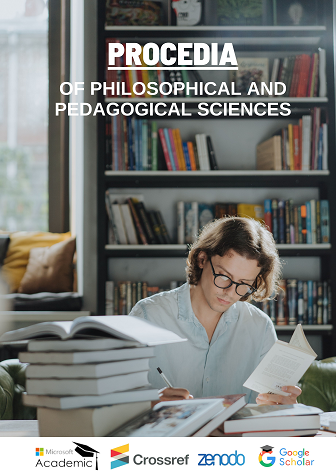Development of a Culture of Information Consumption by School Students through Reading
Keywords:
reading, education, language, social environment, individuals, local areaAbstract
In the modern era, information consumption has become an essential part of everyday life. With the proliferation of digital technologies and online media, individuals are constantly exposed to massive amounts of data. However, the passive absorption of information through screens often lacks depth and critical engagement. Reading, on the other hand, cultivates a more nuanced and thoughtful approach to learning. By developing reading habits from a young age, a culture of active information consumption can be fostered.
References
A. Acerbi, ‘A cultural evolution approach to digital media’, Front Hum Neurosci, vol. 10, p. 636, 2016.
D. Bloome, ‘Reading as a social process’, Lang Arts, vol. 62, pp. 134–142, 1985.
D. Bloome and M. Kim, ‘Storytelling: Learning to read as social and cultural processes’, Prospects, vol. 46, pp. 391–405, 2016.
B. Ferdman, ‘Literacy and Cultural Identity’, Harv Educ Rev, vol. 60, pp. 181–205, 1990.
N. Kirillova, ‘New concepts of media science in the sociocultural system of the information civilization’, Perspekt Nauk Obraz —Perspect Sci Educ, vol. 54, pp. 10–22, 2021.
N. Kirillova and O. Shlykova, ‘Modifying the humanities: Global challenges of the digital revolution’, Perspekt Nauk Obraz —Perspect Sci Educ, vol. 59, pp. 10–23, 2022.
M. M. Asad, ‘Virtual Reality as Pedagogical Tool to Enhance Experiential Learning: A Systematic Literature Review’, Education Research International, vol. 2021. 2021. doi: 10.1155/2021/7061623.
M. Attig, ‘What Impacts Early Language Skills? Effects of Social Disparities and Different Process Characteristics of the Home Learning Environment in the First 2 Years’, Frontiers in Psychology, vol. 11. 2020. doi: 10.3389/fpsyg.2020.557751.
S. A. Charney, ‘Potential Impact of the COVID-19 Pandemic on Communication and Language Skills in Children’, Otolaryngology - Head and Neck Surgery (United States), vol. 165, no. 1. pp. 1–2, 2021. doi: 10.1177/0194599820978247.
J. J. Good, ‘The impact of classroom diversity philosophies on the STEM performance of undergraduate students of color’, Journal of Experimental Social Psychology, vol. 91. 2020. doi: 10.1016/j.jesp.2020.104026.
R. Luo, ‘Home literacy environment and existing knowledge mediate the link between socioeconomic status and language learning skills in dual language learners’, Early Childhood Research Quarterly, vol. 55. pp. 1–14, 2021. doi: 10.1016/j.ecresq.2020.10.007.
M. Muftah, ‘Impact of social media on learning English language during the COVID-19 pandemic’, PSU Research Review. 2023. doi: 10.1108/PRR-10-2021-0060.
G. Soepriyanto, ‘Annual report readability and accounting irregularities: evidence from public listed companies in Indonesia’, Journal of Financial Reporting and Accounting, vol. 19, no. 5. pp. 793–818, 2021. doi: 10.1108/JFRA-01-2020-0006.
M. Attig, ‘Home Learning Environment and Language Acquisition in the First Years of Life’, Sprache Stimme Gehor, vol. 43, no. 2. pp. 86–92, 2019. doi: 10.1055/a-0851-9049.
M. Donmez, ‘A systematic literature review for the use of eye-tracking in special education’, Education and Information Technologies, vol. 28, no. 6. pp. 6515–6540, 2023. doi: 10.1007/s10639-022-11456-z.
A. Osifo, ‘Improving collaboration in blended learning environments through differentiated activities and mobile-assisted language learning tools’, Proceedings of the 15th International Conference on Mobile Learning 2019, ML 2019. pp. 3–10, 2019. doi: 10.33965/ml2019_201903l001.
R. Paul, ‘Does early childhood adversities affect physical, cognitive and language development in indian children? Evidence from a panel study’, SSM - Population Health, vol. 12. 2020. doi: 10.1016/j.ssmph.2020.100693.
R. Samuelsson, ‘How pedagogical relations in early years settings are reconfigured by interactive touchscreens’, British Journal of Educational Technology, vol. 53, no. 1. pp. 58–76, 2022. doi: 10.1111/bjet.13152.
A. Schwabe, L. Kosch, H. Boomgaarden, and G. Stocker, ‘Book readers in the digital age: reading practices and media technologies’, Mob. Media Commun., vol. 11, no. 3, pp. 367–390, 2022, doi: 10.1177/20501579221122208.
E. Pérez, M. Jara, M. Urrutia, and P. Guirao, ‘Emotions and reading: when reading is the best way to improve skills in adolescents’, Front. Psychol., vol. 14, 2023, doi: 10.3389/fpsyg.2023.1085945.
V. Levratto, A. Šuminas, T. Schilhab, and G. Esbensen, ‘Smartphones: reading habits and overuse. a qualitative study in denmark, lithuania and spain’, Educ. Xx1, vol. 24, no. 2, 2021, doi: 10.5944/educxx1.28321.
K. Ogunbodede and O. Sawyerr-George, ‘Digital resources and the reading habits of university students in nigeria’, Int. J. Prof. Dev. Learn. Learn., vol. 5, no. 1, p. ep2304, 2023, doi: 10.30935/ijpdll/12748.
S. Sumiati, M. Nurhidaya, M. Mumtahanah, M. Ratna, and S. Asmi, ‘Utilization of digital media to restore reading interest for university students’, Al-Ishlah J. Pendidik., vol. 14, no. 3, pp. 4513–4522, 2022, doi: 10.35445/alishlah.v14i3.1466.
J. Law, ‘Association of proximal elements of social disadvantage with children’s language development at 2 years: an analysis of data from the Children in Focus (CiF) sample from the ALSPAC birth cohort’, International Journal of Language and Communication Disorders, vol. 54, no. 3. pp. 362–376, 2019. doi: 10.1111/1460-6984.12442.
T. K. Turesky, ‘Home language and literacy environment and its relationship to socioeconomic status and white matter structure in infancy’, Brain Structure and Function, vol. 227, no. 8. pp. 2633–2645, 2022. doi: 10.1007/s00429-022-02560-4.
Downloads
Published
How to Cite
Issue
Section
License
Copyright (c) 2024 Procedia of Philosophical and Pedagogical Sciences

This work is licensed under a Creative Commons Attribution 4.0 International License.
Copyright: © 2024 by the authors. This work is licensed under a Creative Commons Attribution- 4.0 International License (CC - BY 4.0).




